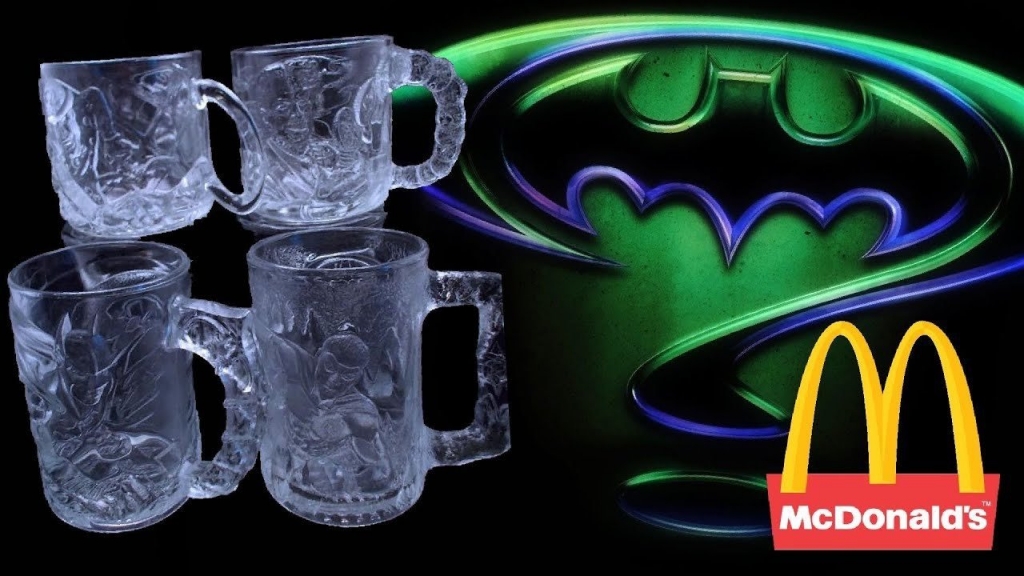
Funko Pop! Ad Icons McDonald’s

Just another nerd.




The European Court of Human Rights ruled in February that activists David Morris and Helen Steel should have received legal aid from the British government in the libel case that McDonald’s filed against them in the mid-1990s. The Court awarded Morris and Steel $25,934 and $19,451 respectively.
Morris and Steel were sued by McDonald’s for distributing pamphlets in 1984 which McDonald’s claimed contained libelous and inaccurate statements. The subsequent trial was the longest libel trial in British history, taking 313 court days culminating in a victory for McDonald’s and a $135,000 fine against Morris and Steel. The verdict against the activists was upheld on appeal, though the damages were reduced.
In appealing to the European Court of Human Rights, the activists’ lawyer argued that Great Britain should have provided legal assistance to Morris and Steel, and that British libel law was biased against the defendant to the point of impinging on Morris and Steel’s right of freedom of expression.
The court, in its decision got it exactly backwards — it ruled that the activists were correct that they should have been given legal aid and that the damages award against them was excessive, but incorrect in their legal criticisms of British libel law.
In its ruling, the European Court of Human Right said,
As to the complaint about the burden of proof, it was not in principle incompatible with Article 10 to place on a defendant in libel proceedings the onus of proving to the civil standard the truth of defamatory statements.
Nor should in principle the fact that the plaintiff in the present case was a large multinational company deprive it of a right to defend itself against defamatory allegations or entail that the applicants should not have been required to prove the truth of the statements made. It was true that large public companies inevitably and knowingly laid themselves open to close scrutiny of their acts and the limits of acceptable criticism are wider in the case of such companies. However, in addition to the public interest in open debate about business practices, there was a competing interest in protecting the commercial success and viability of companies, for the benefit of shareholders and employees, but also for the wider economic good. The State therefore enjoyed a margin of appreciation as to the means it provided under domestic law to enable a company to challenge the truth, and limit the damage, of allegations which risk harming its reputation.
If, however, a State decided to provide such a remedy to a corporate body, it was essential, in order to safeguard the countervailing interests in free expression and open debate, that a measure of procedural fairness and equality of arms was provided for. The more general interest in promoting the free circulation of information and ideas about the activities of powerful commercial entities, and the possible “chilling” effect on others were also important factors to be considered in this context. The lack of procedural fairness and equality which the Court had already found therefore also gave rise to a breach of Article 10.
The fundamental problem in the McLibel case — and similar cases involving British libel lawsuits — is that the burden is excessively on the defendant. In the United States, the plaintiff would have the burden to prove that a given statement made by the defendant was false, for example. In Great Britain, the burden is on the defendant to prove that the statement is true.
Moreover many of the defenses allowed in countries such as the United States and other countries are not available to defendants in Great Britain. In the United States, for example, defendants can argue that they acted reasonably in believing and republishing a nonetheless false statement — in order to prevail in a libel case, a plaintiff must generally show that a defendant acted recklessly and in an unreasonable manner or knew the statement to be false. In Great Britain, this sort of defense is generally not an option (there are some specific exemptions such as a “public interest” privilege for journalists in certain situations).
The result is that the United States and other countries favor more, expansive speech even though it will inevitably result in more falsehoods, whereas Great Britain choose a route that results in (arguably) less falsehoods but at the expense of much more constrained speech.
The former is much preferable in this writer’s opinion. The problem with the McLibel lawsuit is not that Morris and Steel weren’t provided with legal aid — the problem was that McDonald’s not only had a chance at winning such a lawsuit, which it would never even dream of filing in the United States, and that it actually won.
The full text of the European Court of Human Rights’ decision can be read here.
Sources:
‘McLibel’ activists win legal aid case. Associated Press, February 15, 2005.
Court: Activists didn’t get fair trial. Jan Sliva, Associated Press, February 15, 2005.
069
15.2.2005
Press release issued by the Registrar
CHAMBER JUDGMENT STEEL AND MORRIS v. THE UNITED KINGDOM
The European Court of Human Rights has
today notified in writing a judgment[1] in the case of Steel and Morris v. the United Kingdom (application
no. 68416/01).
The Court held unanimously:
Under Article 41 (just satisfaction) of the
Convention, the Court awarded 20,000 euros (EUR) to the first applicant and EUR
15,000 to the second applicant for non-pecuniary damage, and EUR 47,311.17 for
costs and expenses.
(The judgment is available in English and
in French.)
1. Principal
facts
The case concerns an application brought by
two United Kingdom nationals, Helen Steel and David
Morris, who were born in 1965 and 1954
respectively and live in London. During the relevant period Mr
Morris was unemployed and Ms Steel was either unemployed or on a low wage.
Both were associated with London Greenpeace, a small group, unconnected with
Greenpeace International, which campaigned principally on environmental and
social issues.
In the mid-1980s
London Greenpeace began an anti-McDonaldÂ’s campaign. In 1986 a six-page leaflet
entitled “What’s wrong with McDonald’s?” was produced and distributed as part
of that campaign.
On 20 September 1990 McDonald’s Corporation (“US McDonald’s”) and McDonald’s Restaurants
Limited (“UK McDonald’s”) issued a writ against the applicants claiming damages
for libel allegedly caused by the alleged publication by the defendants of the leaflet.
The applicants denied
publication, denied that the words complained of had the meanings attributed to
them by McDonaldÂ’s and denied that all or some of the meanings were capable of
being defamatory. Further, they contended, in the alternative, that the words
were substantially true or else were fair comment on matters of fact.
The applicants were
refused legal aid and so represented themselves throughout the trial and
appeal, with only some help from volunteer lawyers. They submit that they were
severely hampered by lack of resources, not just in the way of legal advice and
representation, but also when it came to administration, photocopying,
note-taking, and the tracing, preparation and payment of the costs and expenses
of expert and factual witnesses. Throughout the proceedings McDonaldÂ’s were
represented by leading and junior counsel, experienced in defamation law and by
a one or, at times, two solicitors and other assistants.
The trial took place
before a judge sitting alone between 28 June 1994 and 13 December 1996. It lasted for 313 court days and was the longest trial in English
legal history. On appeal the Court of Appeal rejected the majority of the
applicantsÂ’ submissions as to general grounds of law and unfairness, but
accepted some of the challenges to the trial judgeÂ’s findings as to the content
of the leaflet. The damages awarded by the trial judge were reduced from a total
of GBP 60,000 to a total of GBP 40,000.
Leave to appeal to the House of Lords was refused. McDonaldÂ’s, who had not
applied for costs, have not sought to enforce the award.
2. Procedure
and composition of the Court
The application was lodged on 20 September 2000 and declared partly admissible on 6 April 2004. A hearing took place in public in the
Human
Rights
Building,
Strasbourg, on 7 September 2004.
Judgment was given by a Chamber of 7
judges, composed as follows:
Matti Pellonpää (Finnish), President,
Nicolas Bratza (British),
Viera Strážnická
(Slovakian),
Josep Casadevall (Andorran),
Rait Maruste
(Estonian),
Stanislav Pavlovschi
(Moldovan),
Lech Garlicki (Polish), judges,
and also Michael OÂ’Boyle, Section
Registrar.
3. Summary
of the judgment[2]
Complaints
The applicants
complained, under Article 6 § 1 of the Convention, that the proceedings were
unfair, principally because they were denied legal aid, and, under Article 10,
that the proceedings and their outcome constituted a disproportionate
interference with their right to freedom of expression.
Decision
of the Court
Article 6 § 1 of the Convention
The applicantsÂ’
principal complaint under this provision was that they were denied a fair trial
because of the lack of legal aid.
The question whether
the provision of legal aid was necessary for a fair hearing had to be
determined on the basis of the particular facts and circumstances of each case
and depended inter alia
upon the importance of what was at stake for the applicant in the
proceedings, the complexity of the relevant law and procedure and the applicantÂ’s
capacity to represent him or herself effectively.
The Court examined the
facts of the case with reference to these criteria.
In terms of what had
been at stake for the applicants, although defamation proceedings were not, in
this context, comparable to, for instance, proceedings raising important
family-law issues, the financial consequences had been potentially severe.
As regards the
complexity of the proceedings, the trial at first instance had lasted 313 court
days, preceded by 28 interlocutory applications. The appeal hearing had lasted
23 days. The factual case which the applicants had had to prove had been highly
complex, involving 40,000 pages of documentary evidence and 130 oral witnesses.
Nor was the case
straightforward legally. Extensive legal and procedural issues had to be
resolved before the trial judge was in a position to decide the main issue.
Against this
background, it was necessary to assess the extent to which the applicants were
able to bring an effective defence despite the absence of legal aid. The
applicants appeared to have been articulate and resourceful and they had
succeeded in proving the truth of a number of the statements complained of.
They had moreover received some help on the legal and procedural aspects of the
case from barristers and solicitors acting pro
bono: their initial pleadings were drafted by lawyers. For the bulk of the
proceedings, however, including all the hearings to determine the truth of the
statements in the leaflet, they had acted alone.
In an action of this
complexity, neither the sporadic help given by the volunteer lawyers nor the
extensive judicial assistance and latitude granted to the applicants as
litigants in person, was any substitute for competent and sustained
representation by an experienced lawyer familiar with the case and with the law
of libel. The very length of the proceedings was, to a certain extent, a
testament to the applicantsÂ’ lack of skill and experience.
In conclusion, the
denial of legal aid to the applicants had deprived them of the opportunity to
present their case effectively before the court and contributed to an
unacceptable inequality of arms with McDonaldÂ’s. There had, therefore, been a
violation of Article 6 § 1.
In view of its finding
of a violation of Article 6 § 1 based on the lack of legal aid, the Court did
not consider it necessary to examine separately additional complaints under
that provision directed at a number of specific rulings made by the judges in
the proceedings.
Article 10 of the Convention
The central issue
which fell to be determined was whether the interference with the applicantsÂ’
freedom of expression had been “necessary in a democratic society”.
The Government had
contended that, as the applicants were not journalists, they should not attract
the high level of protection afforded to the press under Article 10. However,
in a democratic society even small and informal campaign groups, such as London
Greenpeace, had to be able to carry on their activities effectively. There
existed a strong public interest in enabling such groups and individuals
outside the mainstream to contribute to the public debate by disseminating
information and ideas on matters of general public interest such as health and
the environment.
The safeguard afforded
by Article 10 to journalists in relation to reporting on issues of general
interest was subject to the proviso that they acted in good faith in order to
provide accurate and reliable information in accordance with the ethics of
journalism, and the same principle applied to others who engaged in public
debate. In a campaigning leaflet a certain degree of hyperbole and exaggeration
could be tolerated, and even expected, but in the case under review the
allegations had been of a very serious nature and had been presented as
statements of fact rather than value judgments.
The applicants, who,
despite the High CourtÂ’s finding to the contrary, had denied that they had been
involved in producing the leaflet, had claimed that it placed an intolerable
burden on campaigners such as themselves, and thus stifled public debate, to
require those who merely distributed a leaflet to bear the burden of
establishing the truth of every statement contained in it. They had also argued
that large multinational companies should not be entitled to sue in defamation,
at least without proof of actual financial damage. Complaint was further made
of the fact that under the law McDonaldÂ’s were able to bring and succeed in a
claim for defamation when much of the material included in the leaflet was
already in the public domain.
Like the Court of
Appeal, the Court was not persuaded by the argument that the material was in
the public domain since either the material relied on did not support the
allegations in the leaflet or the other material was itself lacking in
justification.
As to the complaint about the burden of proof, it was not in
principle incompatible with Article 10 to place on a defendant in libel
proceedings the onus of proving to the civil standard the truth of defamatory
statements.
Nor should in
principle the fact that the plaintiff in the present case was a large
multinational company deprive it of a right to defend itself against defamatory
allegations or entail that the applicants should not have been required to
prove the truth of the statements made. It was true that large public companies
inevitably and knowingly laid themselves open to close scrutiny of their acts
and the limits of acceptable criticism are wider in the case of such companies.
However, in addition to the public interest in open debate about business
practices, there was a competing interest in protecting the commercial success
and viability of companies, for the benefit of shareholders and employees, but
also for the wider economic good. The State therefore enjoyed a margin of
appreciation as to the means it provided under domestic law to enable a company
to challenge the truth, and limit the damage, of allegations which risk harming
its reputation.
If, however, a State
decided to provide such a remedy to a corporate body, it was essential, in
order to safeguard the countervailing interests in free expression and open
debate, that a measure of procedural fairness and equality of arms was provided
for. The more general interest in promoting the free circulation of
information and ideas about the activities of powerful commercial entities, and
the possible “chilling” effect on others were also important factors to be
considered in this context. The lack of procedural
fairness and equality which the Court had already found therefore also gave
rise to a breach of Article 10.
Moreover, under the
Convention, an award of damages for defamation must bear a reasonable
relationship of proportionality to the injury to reputation suffered. While it
was true that no steps had so far been taken to enforce the damages award
against either applicant, the fact remained that the substantial sums awarded
against them had remained enforceable since the decision of the Court of
Appeal. In those circumstances, the award of damages in the present case was
disproportionate to the legitimate aim served.
In conclusion, given
the lack of procedural fairness and the disproportionate award of damages, the
Court found that there has been a violation of Article 10.
The CourtÂ’s judgments are accessible on its
Internet site (http://www.echr.coe.int).
Registry of the European Court of
Human Rights
F – 67075 Strasbourg Cedex
Press contacts: Roderick Liddell (telephone: +00 33 (0)3 88 41 24 92)
Emma Hellyer
(telephone: +00 33 (0)3 90 21 42 15)
Stéphanie
Klein (telephone: +00 33 (0)3 88 41 21 54)
Fax: +00 33 (0)3 88 41 27 91
The European Court of Human Rights was set up in
Strasbourg by the Council of Europe
Member States in 1959 to deal with alleged violations of the 1950 European
Convention on Human Rights. Since 1 November
1998 it has sat as a full-time Court composed of an equal number of
judges to that of the States party to the Convention. The Court examines the
admissibility and merits of applications submitted to it. It sits in Chambers
of 7 judges or, in exceptional cases, as a Grand Chamber of 17 judges. The
Committee of Ministers of the Council of Europe supervises the execution
of the CourtÂ’s judgments. More detailed information about the Court and its
activities can be found on its Internet site.
[1] Under Article 43 of the European Convention on Human Rights, within
three months from the date of a Chamber judgment, any party to the case may, in
exceptional cases, request that the case be referred to the 17‑member
Grand Chamber of the Court. In that event, a panel of five judges considers
whether the case raises a serious question affecting the interpretation or
application of the Convention or its protocols, or a serious issue of general
importance, in which case the Grand Chamber will deliver a final judgment. If
no such question or issue arises, the panel will reject the request, at which
point the judgment becomes final. Otherwise Chamber judgments become final on
the expiry of the three-month period or earlier if the parties declare that
they do not intend to make a request to refer.
[2] This summary drafted by the Registry is not binding on the Court.